Key takeaways:
- Recognize dental emergencies involve extreme pain, swelling, or visible damage; immediate action is crucial.
- Common causes of broken teeth include physical trauma, biting hard foods, and tooth decay.
- Immediate steps include rinsing the mouth, controlling bleeding, and preserving broken tooth fragments.
- Visiting a dentist after a dental emergency is vital to prevent complications and receive proper treatment.
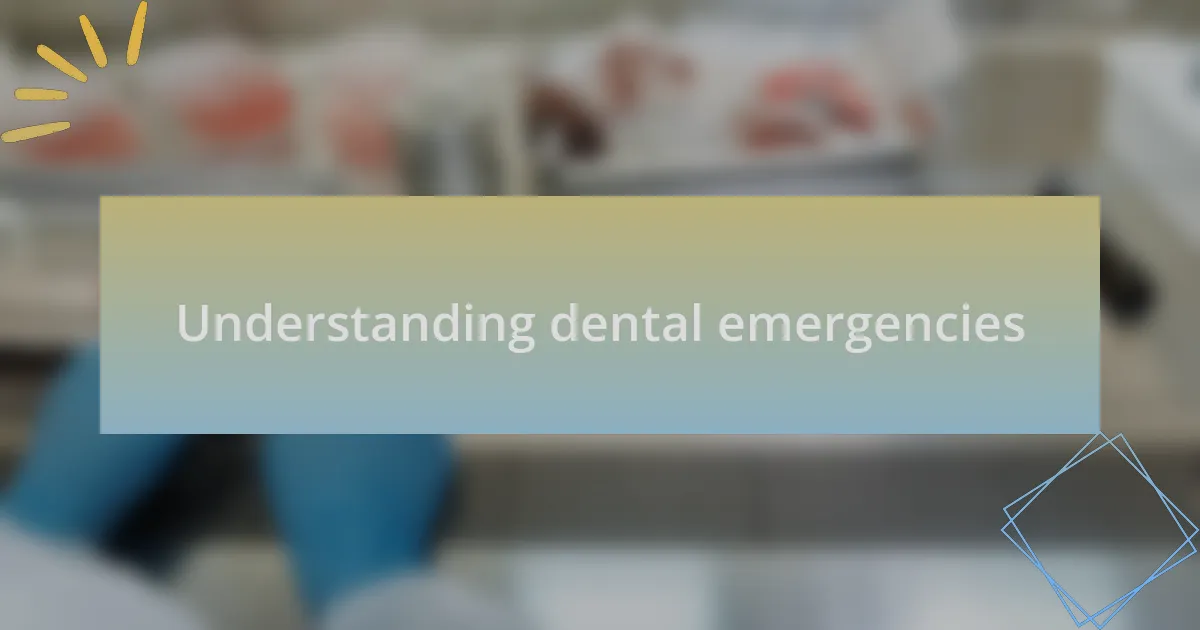
Understanding dental emergencies
Dental emergencies can create intense feelings of panic and confusion. I’ve been there myself; when I broke my tooth, the urgency of the situation hit me like a wave. It’s vital to recognize that not all dental issues are emergencies, but when they involve extreme pain, swelling, or visible damage, you should take immediate action.
Have you ever experienced a sudden crack in your tooth while munching on something hard? That moment of realization is jarring. I remember clutching my jaw, worried not just about the pain, but also about what it meant for my smile. In my experience, distinguishing between a regular dental problem and an emergency can be life-changing, so knowing when to seek help makes a big difference.
Another insight I learned is the importance of having a plan. When panic sets in, it can be difficult to think clearly. I keep the contact info of my dentist handy, so I don’t have to scramble during a crisis. Isn’t having that peace of mind comforting? Emergency dental care is all about timely intervention, and understanding what constitutes an emergency can significantly impact both your physical comfort and emotional well-being.
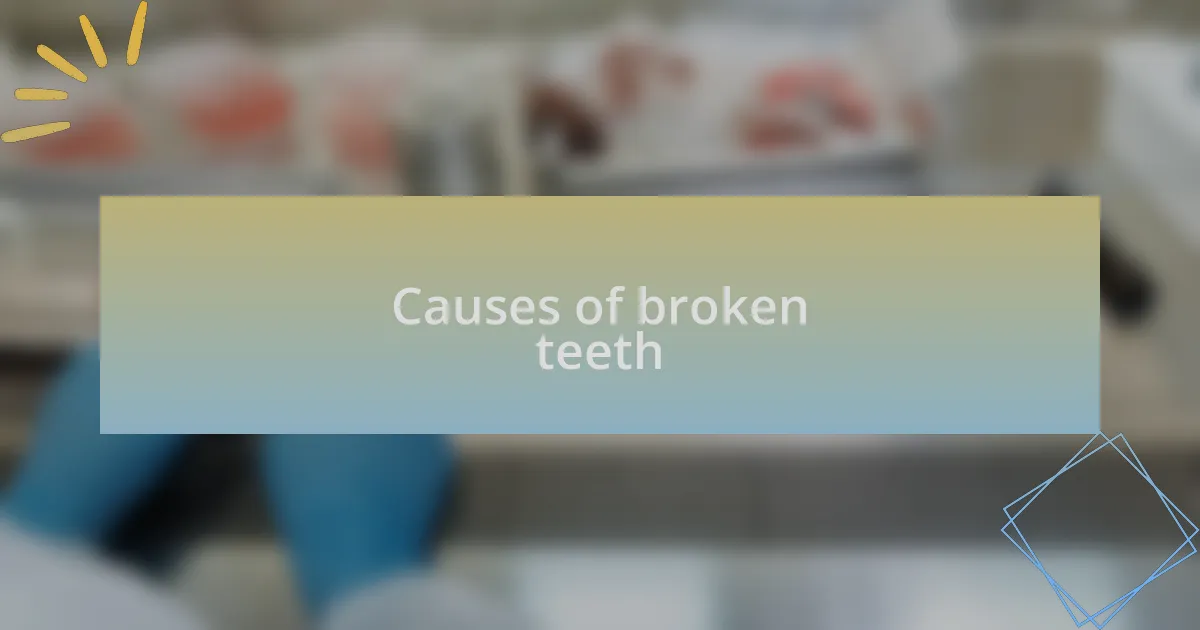
Causes of broken teeth
A common cause of broken teeth is physical trauma. I can recall a friend who was playing basketball when an accidental elbow to the face led to a cracked molar. The sudden realization of a broken tooth during such moments can be shocking and painful, reminding us that accidents can happen to anyone at any time.
Another frequent reason is biting into hard foods. I once had an embarrassing moment with a popcorn kernel that was unusually hard. The sudden jolt and the crack reverberated in my mouth like echoes of my favorite movie—a painful reminder that sometimes, our cravings can lead to unexpected consequences. Have you experienced a similar mishap while enjoying your favorite snacks?
Lastly, tooth decay can weaken our teeth, making them more susceptible to breaking. I knew someone who had been avoiding dental visits due to fear. Unfortunately, their untreated cavities progressed, and they ended up with two broken teeth in one unfortunate day. It’s a reminder that neglect can lead to more severe issues, prompting us to prioritize our dental health before it results in an emergency.
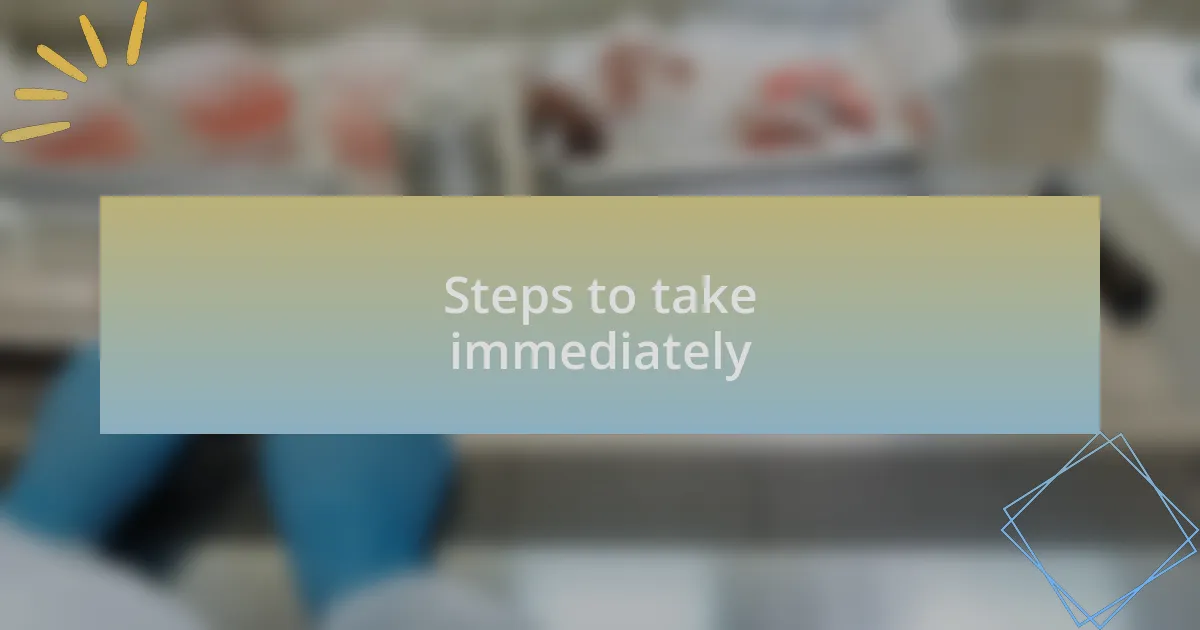
Steps to take immediately
When you realize you’ve broken a tooth, your first instinct might be panic. The first step is to rinse your mouth gently with warm water to clean the area. I remember doing this after my own experience—it felt soothing and helped me assess the damage without too much discomfort. Have you ever faced that moment of uncertainty and anxiety?
Next, try to control any bleeding with a piece of gauze or a clean cloth. I vividly recall how comforting it was to have something to bite down on, feeling a sense of control in an otherwise chaotic situation. Keeping the pressure steady made all the difference for me. If bleeding continues for more than 10 minutes, do you know when it’s time to seek professional help?
Finally, if pieces of your tooth have broken off, preserve them if possible. I once made the mistake of tossing a broken fragment, only to regret it later at the dentist’s office. Storing it in a small container with milk can help if reattachment is an option. It’s fascinating how something so small can hold such importance in your journey to recovery. Have you thought about how every step adds to the healing process?
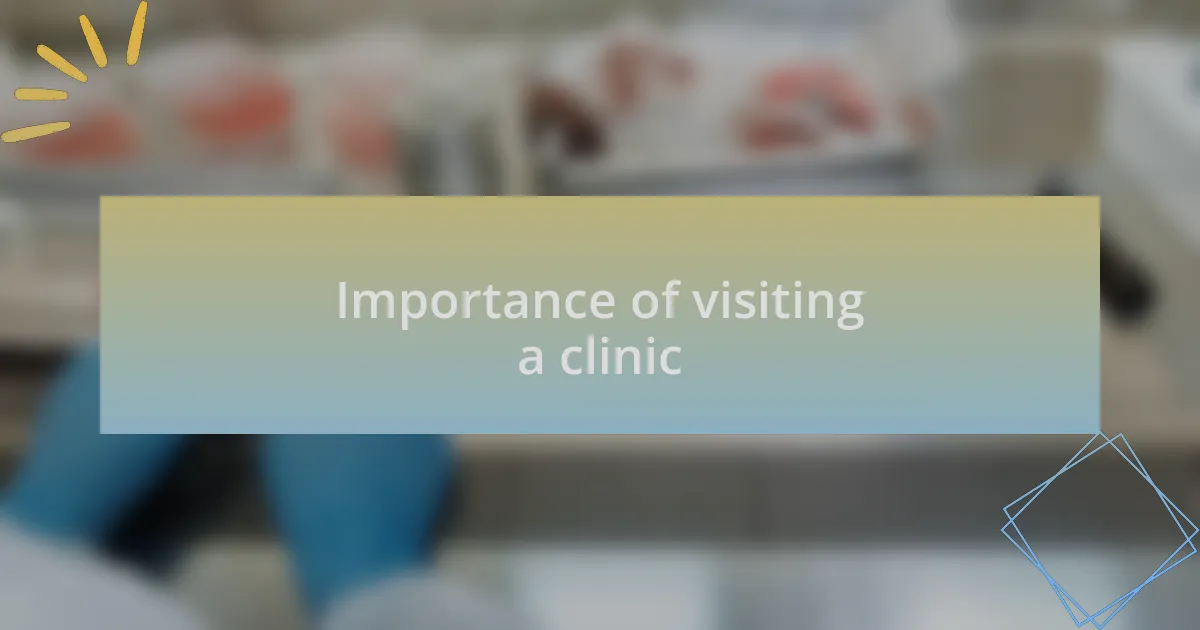
Importance of visiting a clinic
Scheduling a visit to the dental clinic after breaking a tooth is vital for several reasons. I recall feeling a mix of anxiety and relief when I finally got into the chair at my dentist’s office. There’s something incredibly reassuring about being in the hands of a professional who can assess the damage accurately and provide not just treatment, but also guidance. Have you ever left a clinic feeling that weight lift off your shoulders, knowing you’re in good hands?
The dental clinic offers advanced tools and expertise that can make all the difference in your recovery. During my visit, the dentist used imaging technology that revealed issues I hadn’t even considered. It was eye-opening to realize how much our teeth can hide beneath the surface. Has it ever struck you how much we take for granted until we face a health hurdle?
Ignoring a broken tooth can lead to complications, such as infections or further damage. I’ve seen friends delay their appointments, only to end up needing more extensive work later. It made me appreciate the importance of prompt action. Isn’t it fascinating how proactive care can often save us from bigger problems down the line?
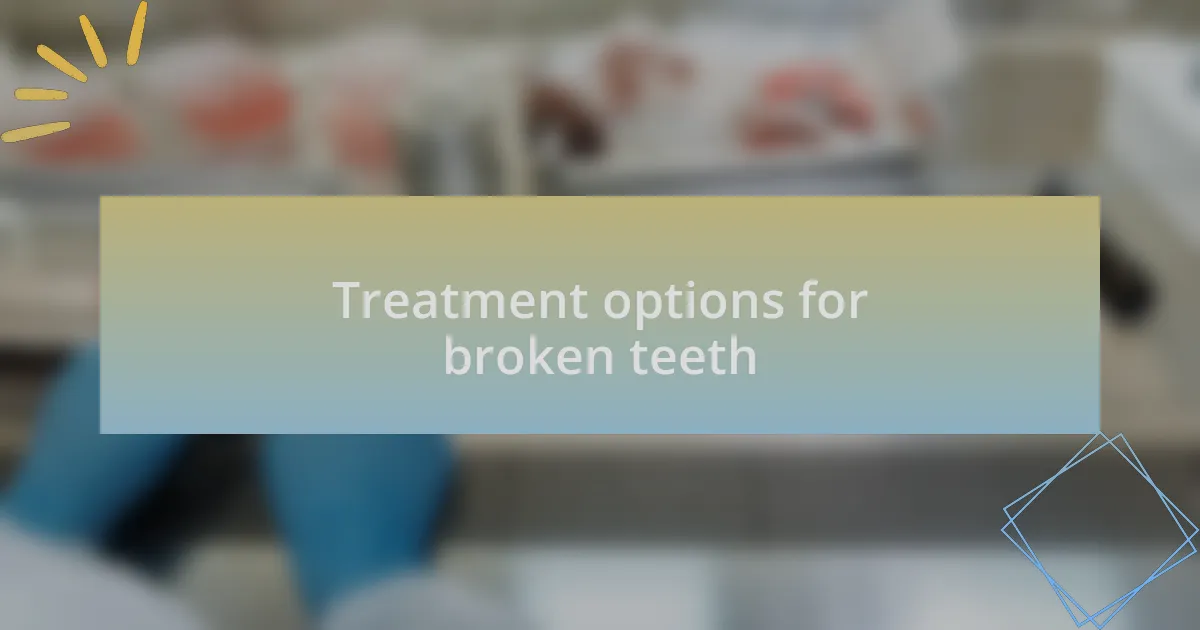
Treatment options for broken teeth
When it comes to treating a broken tooth, there are several options that a dentist might recommend based on the severity of the damage. For minor chips, I found that dental bonding can be a quick and effective solution. It’s fascinating how a composite resin can blend seamlessly with my natural teeth, restoring both function and appearance in just one visit. Have you ever marveled at how a tiny repair can bring back your confidence?
If the break is more significant, crowns often become necessary. I remember my dentist explaining that a crown would encase my tooth, providing strength and protecting it from further harm. The process felt a bit daunting, but once the crown was placed, I was amazed by how natural it felt. Have you ever experienced that moment of relief when something that seemed so complex turned out to be just right?
In cases where the root is damaged, a root canal might be on the table. I vividly recall my apprehension before this procedure; it sounded intimidating. However, knowing it was essential for saving my tooth made it easier to embrace the process. Doesn’t it feel empowering to take control of your dental health, even when faced with intimidating treatments?
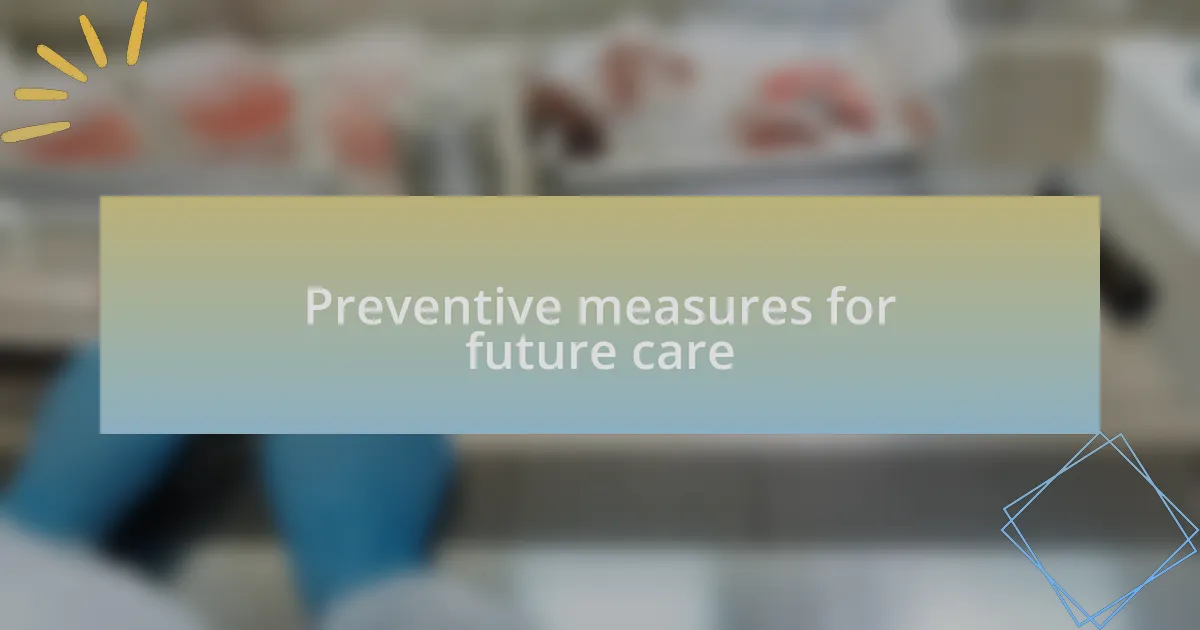
Preventive measures for future care
One of the best ways to care for my teeth and prevent future issues is through maintaining a consistent oral hygiene routine. I’ve learned that brushing at least twice a day and flossing regularly not only keeps my mouth feeling fresh, but also significantly reduces the risk of cavities and damage. Have you ever noticed how much more confident you feel knowing you’ve dedicated those few moments each day to your dental health?
Regular dental check-ups are another crucial aspect I’ve integrated into my routine. I initially thought visiting the dentist was just a chore, but I now view these appointments as vital checkpoints for my dental health. The peace of mind that comes from knowing my teeth are in good condition is priceless. Isn’t it fascinating how much a simple dental visit can prevent more serious issues down the line?
Moreover, being mindful of the foods and drinks I consume has changed my approach to dental care significantly. I used to indulge in sugary snacks without a second thought, but now I opt for healthier choices that support my teeth. It’s empowering to see how diet plays a role in dental health. Have you ever realized how much control you can take just by being selective about what you eat?